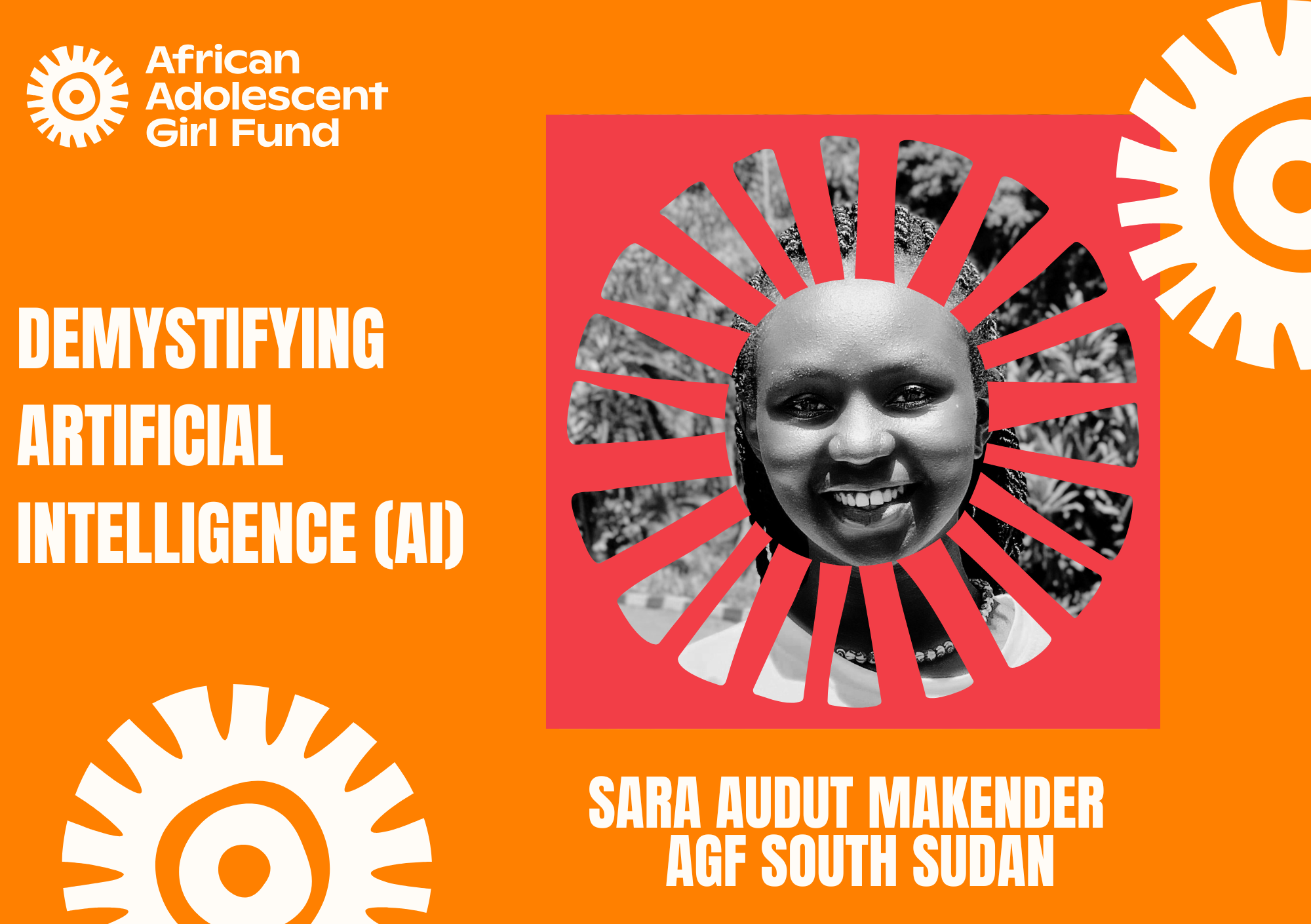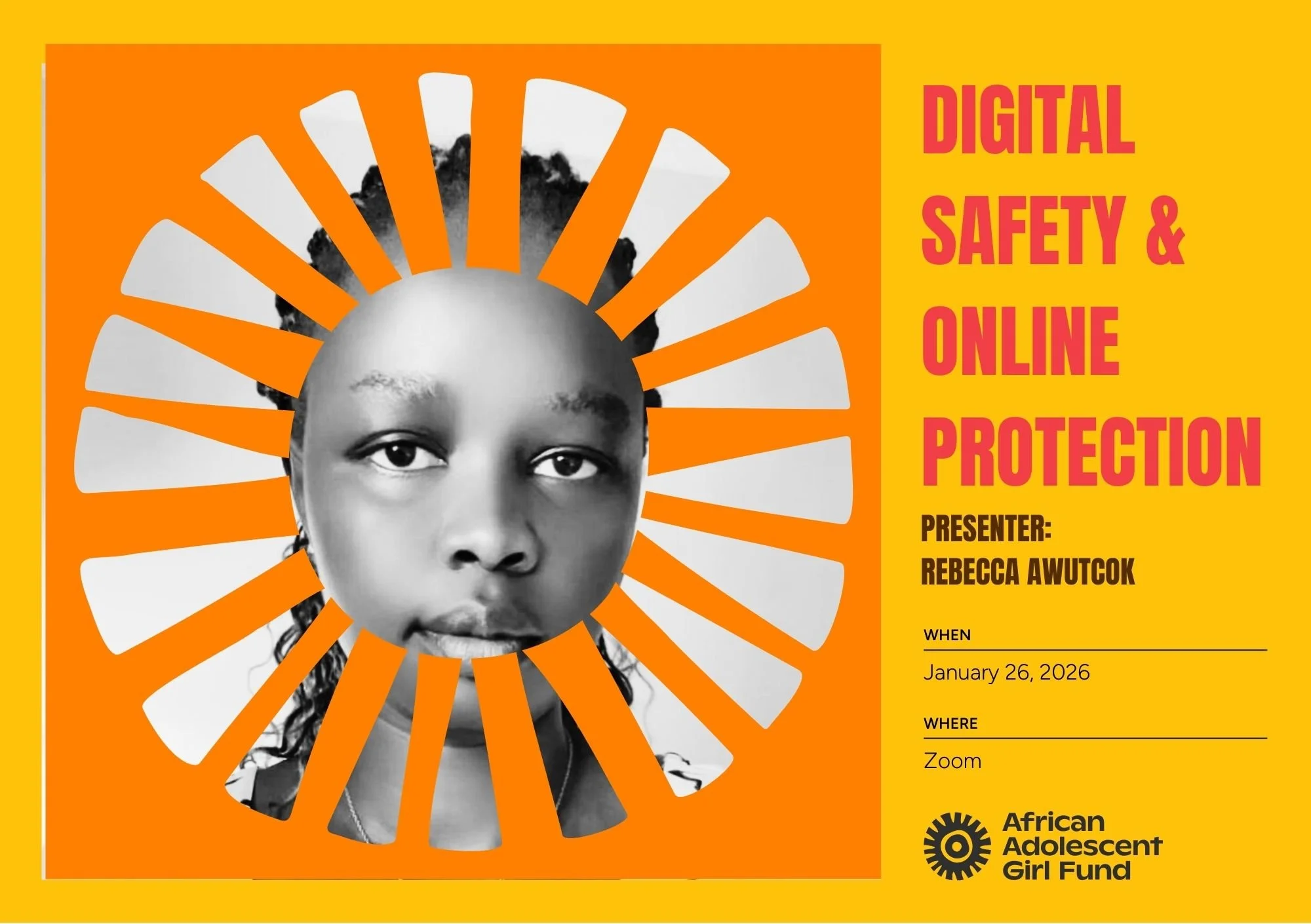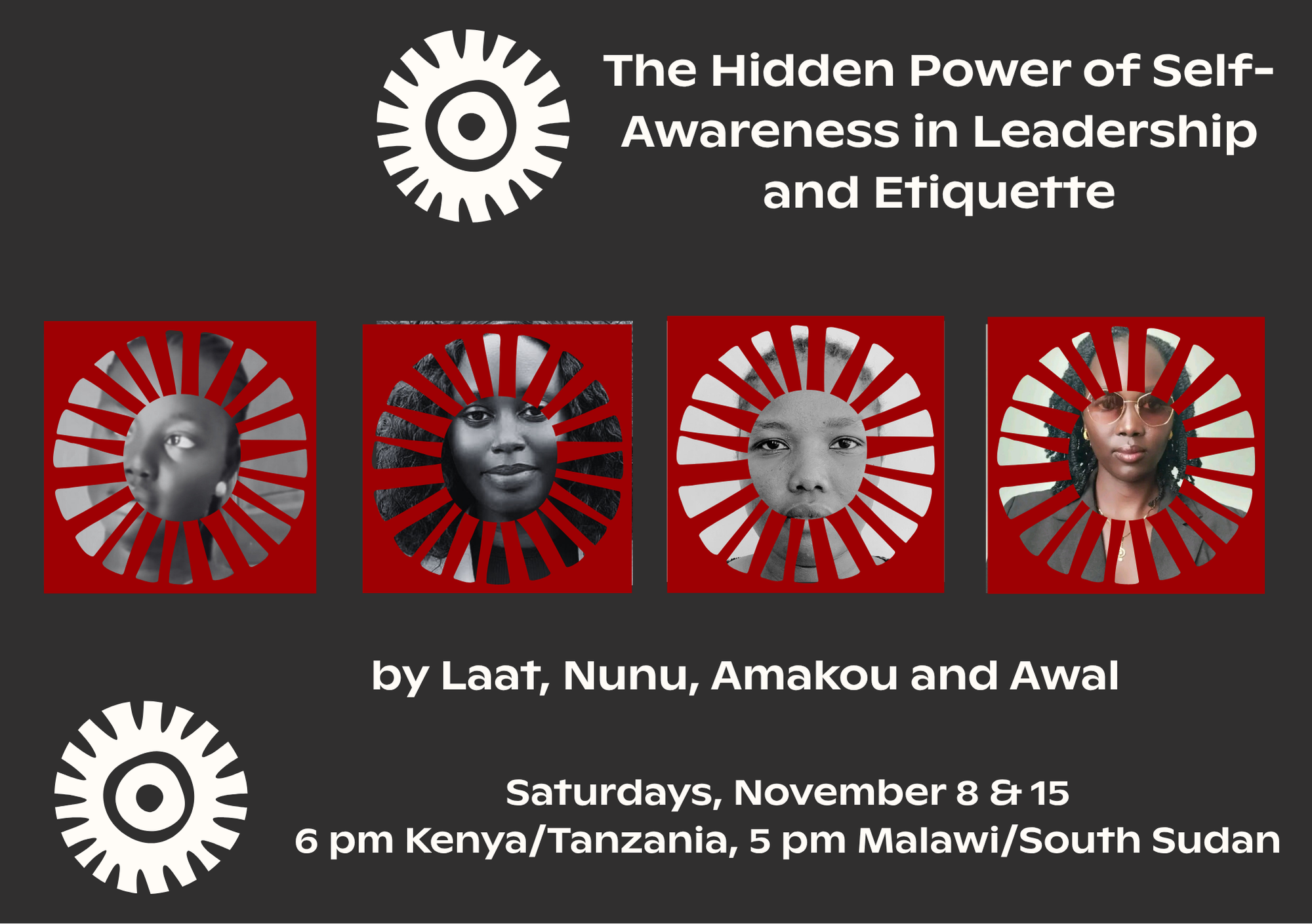Objectives
1. To introduce AI concepts in a clear, simple, and non- technical manner
2. To explore how AI is used across different academic disciplines
3. To encourage ethical and responsible use of AI in academic work
4. To promote interdisciplinary learning and collaboration in an online setting
5. To help students reflect on AI’s impact on future careers and society
Digital Safety & Online Protection
Facilitated by: Rebecca Awutcok
University students increasingly use digital platforms for learning, communication, and social interaction. While these tools provide great opportunities, they also come with risks such as online scams, phishing, cyberbullying, data breaches, and misuse of personal information.
This peer-to-peer session aims to raise awareness, provide students with practical strategies, and empower them to use digital tools safely and responsibly.
The session aims to:
Increase awareness of key digital risks, including online scams, phishing, data privacy breaches, and unsafe social media practices.
Provide AGF university students with practical skills to safeguard personal data, online accounts, and digital identities.
Promote responsible and ethical online behavior to reduce exposure to digital harm.
Encourage informed decision-making and confidence in navigating online spaces safely.
Special Needs Awareness Session Launch
Facilitated by: Kundi & Thuyshime | Participants: AGF Scholars from multiple partner schools
The Think Hub launched its Special Needs Awareness Program with an engaging session led by AGF University scholars Kundi (South Sudan) and Rishim (Malawi). The session created a safe and reflective space for participants to explore how inclusion and empathy shape leadership.
Through open dialogue, participants learned about different types of disabilities — including physical, learning, and sensory challenges — and discussed how awareness and communication can foster inclusive school environments.
A highlight of the conversation was a thoughtful debate on whether pregnancy could be classified as a disability, which encouraged participants to think critically about social perceptions, empathy, and respect for individual experiences.
The group also explored the causes of disability, such as genetic factors, accidents, malnutrition, and harmful cultural practices, while proposing ways to make their communities more accessible and supportive. Suggested actions included raising awareness, improving infrastructure, and challenging stigma through education and leadership.
will be updated soon
Reproductive Health & Sexual Wellness
In late October and early November 2025, AGF University students led a powerful peer-to-peer learning initiative on Reproductive Health and Sexual Wellness.
Two sessions — each 75 minutes long — brought together more than 110 participants from high schools, internships, and universities across the AGF network, creating a safe space for open dialogue on topics often considered taboo.
The student facilitators guided discussions on:
Contraception and STI prevention
Menstrual and reproductive health
Cultural stigma and misinformation
Bodily autonomy, dignity, and human rights
Through myth-busting exercises, breakout conversations, and shared personal experiences, participants increased their health literacy, reduced shame, and built confidence to speak openly and support one another.
Key Outcomes
Increased knowledge and informed decision-making
Reduced stigma and greater openness to discuss sensitive topics
Strengthened peer networks and leadership skills
Commitment to ongoing peer-support circles in schools
Priscilla Adong & Atong Athian & Acingath Malok Majak
“A surprising challenge was confronting deeply ingrained myths — especially the belief that contraceptives cause infertility. It required sensitivity and respect while establishing evidence-based truth.”
— Priscilla
“Seeing the girls gradually gain confidence inspired me deeply. At first, many were shy, unsure whether it was acceptable to ask questions. As information became clearer and relatable, they opened up and engaged meaningfully.”
— Esther
“I expected silence because of the sensitivity of the topic, but instead the participants asked complex and honest questions. Their depth of thinking surprised and inspired me.”
— Atong
smart money for a brighter future
In October 2025, AGF university students facilitated 3 peer-to-peer learning sessions on Financial Literacy, bringing together AGF students from high school, internships, and university.
Their aim was to build financial confidence and equip young women with practical skills in budgeting, saving, spending discipline, and long-term planning.
The session used a highly engaging, interactive format — group discussions, real-life examples, Q&A segments, and reflections. Participants connected financial decision-making to independence, dignity, and female leadership.
Key Outcomes
Increased understanding of budgeting and savings strategies
Recognition of financial planning as a foundation for economic freedom
Empowerment to set realistic goals and track progress
Motivation to build a culture of discipline and responsibility among young women
Follow-up plan: creating personal savings goals and forming accountability peer groups
Why It Matters
Financial literacy is a critical tool in preventing vulnerability and dependence. When young women understand money, they are better equipped to protect themselves from exploitation, early marriage, and economic instability — giving them power over their choices and future.
Participant Quotes
“I learned the importance of saving even if it’s little. Saving helps with unexpected needs, emergencies, or a future investment.”
“I used to think budgeting was only for people with a lot of money, but now I understand I can start with the little I have and grow with discipline.”
“It inspired me to build a culture of accountability in how I use money, instead of spending carelessly.”
“Financial literacy supports independence — and independence gives women a voice.”
Takeaways from the Facilitators
“Next time, I want to add real case studies and examples from successful young entrepreneurs to inspire practical action.”
“I was encouraged by the honesty of the participants. Many shared their struggles openly and supported one another.”
Why Climate Change Matters for Girls - Spot It and Solve It
In September 2025, AGF university students in Malawi led two 75-minute peer-to-peer sessions titled “Why Climate Change Matters for Girls – Spot It, Solve It.”
The programme brought together 99 participants from high school, internship, and university levels across the AGF network. The aim was to explore how climate change affects girls’ daily lives and to activate young women as eco-leaders within their communities.
Through presentations, breakout-room discussions, and real-life examples, participants connected scientific understanding to lived experiences — highlighting how droughts, flooding, food insecurity, water scarcity, and extreme heat disproportionately affect girls and women.
Key Outcomes
Increased understanding of climate change causes and consequences
Empowerment to take local action, including mitigation and adaptation strategies
Strengthened peer support and leadership confidence
Creation of a follow-up action plan: small community climate initiatives led by AGF students
Next Steps
Participants will identify climate challenges in their own communities and begin school- and community-based initiatives, such as tree planting, water conservation actions, and awareness campaigns. Progress will be monitored through periodical check-in forms and shared learning.
Voices from the Session
“Climate change affected me when our house flooded and we had to move the children onto the top bunks because the water was too high.”
“During the heat waves, the temperatures were so extreme that some people fainted.”
“The dry season dried up our river, our only water source. Now we walk long distances every day just to collect water.”
Reflections from the Facilitators
“The high level of participation surprised me. The engagement showed powerful support and shared responsibility.”
“Their questions pushed my thinking and reminded me how urgently we must educate each other and lead change.”
“Next time, I want to improve interactivity to engage even the quiet voices more strongly.”
Strong Minds, Strong Girls: A Peer Conversation on Mental Well-Being
will be updated soon
Shaping the Future – Why Education Matters and Why We Need More female Teachers
In July 2025, 3 AGF university students facilitated two 75-minute Peer-to-Peer sessions on educational empowerment and the critical need for more female teachers across Africa.
The sessions brought together students from high school, internship, and university levels, creating a safe space for open discussion on how education transforms lives and why female representation in teaching is essential for girls’ confidence, safety, and aspirations.
Through interactive discussions, breakout rooms, and shared personal experiences, participants explored how education shapes identity, opportunity, and dignity — and why young women must claim leadership within education systems.
Key Outcomes
Deepened understanding of the value of education beyond academic results
Recognition of the urgent need for more female teachers as role models
High participation and active contributions from all groups
Growth in communication skills and confidence among facilitators
Commitment to advocating for female teacher leadership in schools
“I learned that there is a real need to advocate for more female teachers across Africa.”
You Are Not Alone – Mental Health, Growth & Resilience for Young African Women
In June 2025, AGF university students Joyce Pauline (Karatina University, Kenya) und Maria Carmel Zacharia (University of Iringa, Tanzania) facilitated three 75-minute Peer-to-Peer sessions on mental health, emotional resilience, and the power of solidarity among young African women.
The sessions addressed emotional challenges faced by girls and young women, helped break the silence around mental well-being, and created a safe space for honest sharing, listening, and connection across different cultures and experiences.
Through guided conversations, breakout rooms, personal reflection exercises, and interactive questions, participants explored coping strategies, support systems, stress management, and the importance of asking for help.
Key Outcomes
Increased confidence in speaking about emotional struggles
Deepened understanding of mental health as strength, not weakness
Safe-space culture enabling even shy girls to express themselves
Strong engagement, openness, and mutual support across the group
Growth in leadership skills, time management, and co-facilitation for both leaders
Voices from the Facilitators
“I learned that girls face emotional challenges, and when given a safe space, they open up. Being present, listening deeply, and being relatable matters more than trying to be perfect.”
— Joyce Pauline
“The best moment was seeing how active and happy the girls became as we continued. They supported each other and shared openly — that showed me our time together was valuable.”
— Maria Carmel Zacharia“The girls who were shy in the large group gained confidence in the breakout rooms and expressed themselves freely.”
— Joyce Pauline
“This experience taught me that being a peer leader is not only about teaching others, but learning from them.”
— Maria Carmel Zacharia
Start Where You Are – Small Steps to Big Change in Your Community
May 2025
Facilitator: Jacinta Achieng Akinyi (AGF alumna Mukuru, Kenya)
Field of Study: Sustainable Human Development
Session 1: What is Social Development – and Why Do We Matter?
Objectives: Understand the basics of social development and explore personal relevance.
Session 2: From Ideas to Action – Starting Small Projects
Objectives: Learn how to move from ideas to small-scale community action.
Session 3: Your Voice, Your Impact – Empowerment through Communication
Objectives: Build confidence in using your voice for leadership and change.











